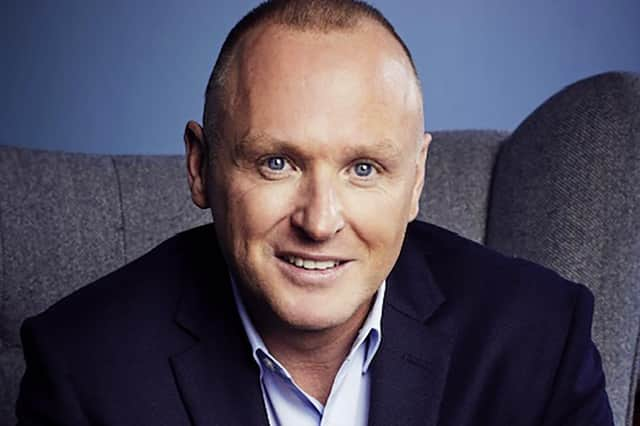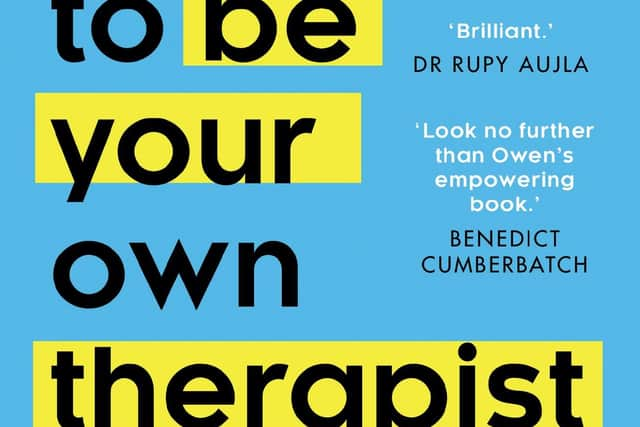Psychotherapist Owen O'Kane on how his new book, How to Be Your Own Therapist, can help the January blues


This article contains affiliate links. We may earn a small commission on items purchased through this article, but that does not affect our editorial judgement.
When I speak to London-based psychotherapist and author Owen O’Kane, he’s distracted by his West Highland terrier.
The dog is demanding some of the Greggs sausage roll that his master is attempting to hide from him. In the end, he manages to win a scrap.
Advertisement
Hide AdAdvertisement
Hide AdWell, a little of what you fancy is good for you, especially in January.


We’re all miserable at this time of year, which is why O’Kane’s new paperback version of his recently released book, How to Be Your Own Therapist, is such a timely read. It follows his other two best-selling books, Ten to Zen and Ten Times Happier.
This publication challenges us to start 2024 with a bit of self examination. It’s peak time.
“December is like a drug. It's almost like people get fooled into believing that everything's gonna magically be better. Everywhere we go, it’s glitter, bright lights, the music, the advertisements, almost like a promise,” says O’Kane. “I think a lot of people get sucked into that rhythm and then we crash into January and suddenly reality hits, and it's cold, dark and wet, bank balances are low and the news headlines surround us. So of course we see our referrals go through the roof”.
Using tools that the busy author, who also has a BBC 5 Live Sunday evening slot and a busy London practise, has picked up during 25 years of experience, the newest release aims to get to the root of any mental health troubles, using practical tools.
“There's plenty out there but there isn't a lot of expert stuff based on solid clinical experience and I have the privilege of years of experience under my belt,” says O’Kane, who’s originally from Northern Ireland. “My last job was as a clinical lead in the NHS for mental health and I did that up until about five years ago. Then my first book came out. It was the first time I'd done one so I just didn't know how the landscape worked and what was going to happen. The topic exploded and was translated into 20 languages. So that just took my career off in a different direction”.
The book encourages readers to check-in with themselves, using therapeutic techniques that take 10 minutes a day. These encourage self awareness and allow you to discover your negative thought patterns and triggers. Though it’s not a replacement for meeting a therapist, this paperback covers similar ground, at a time when waiting lists are long and going private might be prohibitively costly. However, you have to be truthful with yourself.
“The first half of the book encourages people to understand their life story. It's like a jigsaw,” says O’Kane. “What I see happening in therapy is that people will tell their story, but often they will give you the polished or rehearsed version, so you have to say, look, I want this to be brutally honest but in a non-judgmental, compassionate way”.
Advertisement
Hide AdAdvertisement
Hide AdOnce you’re more aware of your habits, it’s easier to break them. Or, at least, understand them.
“They may discover that they've got a pattern where they don't like criticism because they had a critical father or mother, then they're in that situation when someone gives them constructive criticism or feedback and they take that as an attack,” O’Kane says. “So you're helping people say, look, some of these reactions may have nothing to do with what's actually going on. It could be that you've cognitively misinterpreted what's been said here, or you have a series of patterns that often get in the way of your life. Some people catastrophize, others think the worst or have a very fixed view of how life and people should be. I guess a large part of this work is about that psychological flexibility to take ownership and think, okay, what part of me could potentially be making the situation worse?”
Then you can break these negative biases, with the help of CBT, mindfulness, journalling, or other tools. O’Kane has been selective about what he recommends. The wellbeing industry is huge, and buzzword-y things like cold water swimming, yoga, or breathing exercises, are brilliant, but not necessarily an entire solution in themselves. In the end, addressing the root causes of, say, negative thinking or worrying, might be more helpful than treating the symptoms. You might have to go deeper for that.
“I'm not going to knock breathing techniques because they work and act on the parasympathetic nervous response. We know there's a lot of stuff out there on cold water - people have benefited from that. We know the benefits of fitness and exercise. All of these things are massively helpful,” says O’Kane. “I'm never overly prescriptive to people about what they should do. However, if you keep running away from yourself and don't tackle the issues that are going on, all you're doing is putting the plaster on symptoms”.
The problem is that tackling mental health issues is difficult, and there is no magic bullet. "Or fairy dust,” sys O’Kane.
He also prefers not to label anyone. The book isn’t a manual for a specific problem, just a helpful accompaniment for those who’re going through a difficult period, like the ones you have when there’s change, loss or failure in life. He doesn’t want to offer a diagnosis.
“I think there's a big difference between mental wellbeing and a mental health disorder. And the conversations got a bit confused over the last couple of years. People are talking about mental health, which on one level is a really positive thing, but I also think there are times that it’s been over-pathologized or sometimes used in other contexts,” says O’Kane. “I try to work from a broader platform in the sense that I believe that every human being will have periods when they're low or demotivated, anxious, overwhelmed or completely exhausted and burnt out. We're all on a continuum really, depending on what's going on in our lives. Rather than make that a problem in itself, I'm trying to humanise that. Sometimes things will be tough. Things may be a bit difficult and that doesn't mean there's anything wrong with you or that you're a problem. It just means you're a human being”.
How to Be Your Own Therapist by Owen O’Kane, HQ, £9.99 paperback
Comments
Want to join the conversation? Please or to comment on this article.